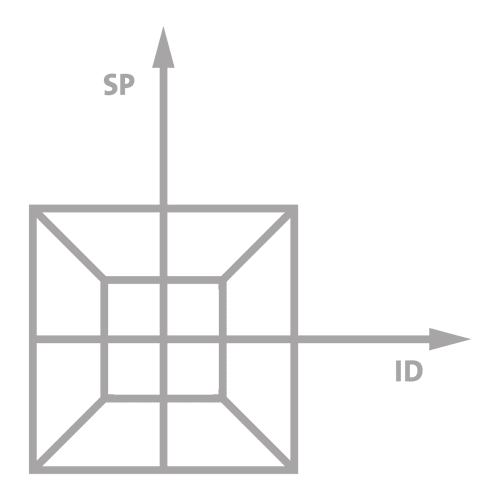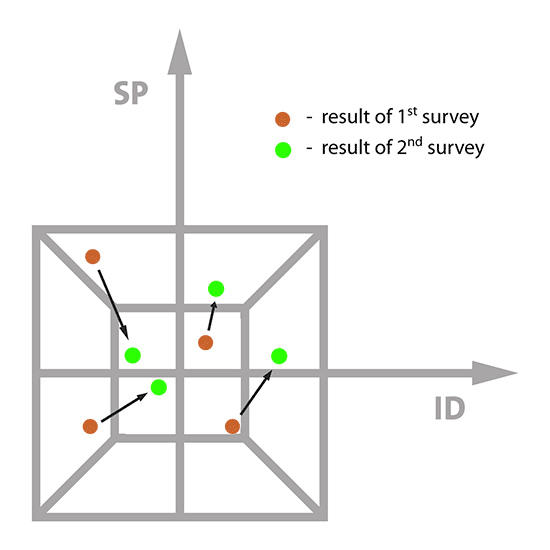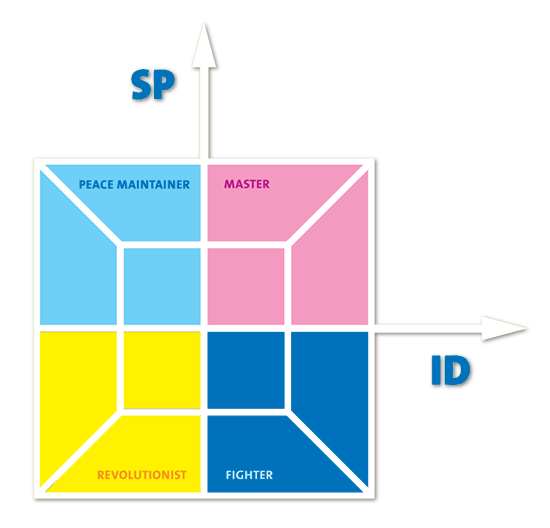SPID® is a dynamic system based on measurable and traceable individual development.
The SPID® name includes four cardinal behaviour forms, communication strategies which can be used in business communication: S (Sympathy) – Sympathy gaining, P (Partnership) – Relationship management, I (Information) – Information gaining, D (Defensivity) – Assertiveness. Conscious mastering of these strategies leads to much more effective working habits within sales, customer service, negotiations, leadership and other activities as well.

The SPID® questionnaire enables us to locate the current position of each individual and the whole group as well within the coordinate-system of the four strategies.
Each position shows the person’s ability of using the given strategy and the level of conciousness involved in using these skills.
The test ensures that the training focuses on the required, lacking areas to be developed. Along the trainings, based on their previous test results participants make their own individual development projects.
The starting point of creating the SPID?method is the nowadays more and more increasing demand for the application of modern, or rather different approach communication techniques. This phenomenon can mainly be owed to the fact that the „traditional” methods, communication panels have largely built in to the training-participants’ behaviour.
On the other hand, there is an increased demand on behalf of HR and group managers that practical effects of the training and individual progress should be monitored and followed closely.
The SPID® system and its questionnaire meets these demands.
The following step is about how participants manage to achive their goals. They get to know the theoretical background and know-how related to each strategy to be applied and they experiment the practical techniques for proper implementation. All strategies are clarified in depth by the trainer through situational exercises. The new know-how is integrated throughout difficult situations brought from real life work experience.
Three months later the SPID® 2. test is filled out which is analogue with the first one. This test determines individual and group position shifting within the system with regard to the direction and scale of each shift.
Based on the test results the directions of further development are determined.
The PROCESS takes place as follows:
- All participants fill out the test.
- On the very first day the trainer presents the SPID® system and based on their own test results participants get to know become aware of their position on the coordinate system.
- Having done that, they become aware of the meaning of the positions (the test results) through everyday work examples and following an interactive conversation their personal development projects are drawn up.
- The following step is about how participants manage to achive their goals. They get to know the theoretical background and know-how related to each strategy to be applied and they experiment the practical techniques for proper implementation. All strategies are clarified in depth by the trainer through situational exercises. The new know-how is integrated throughout difficult situations brought from real life work experience.
- Three months later the SPID® 2. test is filled out which is analogue with the first one. This test determines individual and group position shifting within the system with regard to the direction and scale of each shift.
- Based on the test results the directions of further development are determined.

The meaning of the letter „S” is sympathy gaining.
This type of behaviour has a vital importance in the successful outcome of the various interaction situations. The basis of its establishment is the client-centred psychology, introduced by Rogers, which suggests such an intuitive and emphatic behaviour that, with the aid of it, can interest the individual’s interaction partner to form the events in accordance with his goals. The effective sympathy gaining behaviour is a kind of attitude, disposition, which has a decisive effect on the quality of communication. This type of behaviour can be improved in every human being. It can even become a stable personality trait, and by this means it improves business success significantly.
The meaning of the letter „P” is relationship management with the partner.
In „P”-type situations behaviour is directed towards the establishment, maintenance, improvement or repression of a relationship. Relationship management behaviour means innovation from several points of view in the sphere of business communication. First of all, it tries to change the general tendency that people in a business communication situation tend to think in a “winner-loser” conceptual pair and by so doing they concentrate more on the means than the goals. Furthermore, in contrast with “manipulative” communication, it proclaims the importance of authentic communication, which means the creative expression of feelings and thoughts connected to the various interactive situations. According to Abraham Maslow, the humanist psychologist, in case of authentic communication “falsehood is reduced to zero”. In every organization which is developing, changing, or rather laying claim to competition-demand disagreements, conflicts are unavoidable. The attainment of effective relationship managing behaviour helps the individual not to avoid the conflicting situations, but to direct it and utilize it in the interest of the organisation.
The meaning of the letter „I” is information gaining behaviour.
The main element of information gaining behaviour is the aimed confirmation of the manifestations of the partner, important for us, to the necessary level and direction, and the fair decoding of the originated communication. The mentioned factors demand characteristics from the individual such as active, deliberate listening, and the ability to compare verbal and non-verbal channels. The demand for developing this behaviour type is reinforced by research in the sphere of communication, according to which 10 percent of persons involved in business life are good listeners. Information gaining behaviour is also an improvable personality trait, and as a communication strategy it constitutes one of the ground pillars of effective business discussion.
The meaning of the letter „D” is assertiveness.
„D” type behaviour is mainly characteristic of situations in which the individual’s principal aim is to enforce his interest. Assertive behaviour is based on Richard Ryan’s self-determination, or rather Carl Rogers’s self-actualisation concepts. The assertive person is clear about his rights, he is able to enforce them, and can effectively handle those situations in which he has to say no, resist temptation, or just react to criticism. Such a person does not represent a certain type of personality, but rather a functional form, which anyone can acquire if he is willing to live in this way.
In the system of co-ordinates used for illustrating the SPID® profile the two axis are the SP and the ID axis, and along them 4 different types can be separated.

In the upper right quarter of the system of co-ordinates we can find the „Master“ quadrat, where are those participants who have successfully acquired, or possess on a certain level of the four basic types of communication. Theoreticaly the goal is to achieve this position in the system but determination of exact directions must always depend on the company’s profile.
The upper left quadrat represents the „Peace maintainer“, an individual who conciously applies S and P strategies, but rather ignores the other two.
The „Fighter“ (lower right quadrat) has a conscious control of I and D factors, on the other hand S and P factors of communication remain ignored.
Finally,the lower left quadrat denotes the „Revolutionist“ type, led mainly by his disposition and rarely beeing aware of the current situation and the appropiate strategy to be applied.

